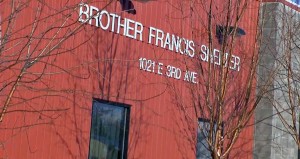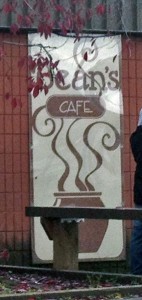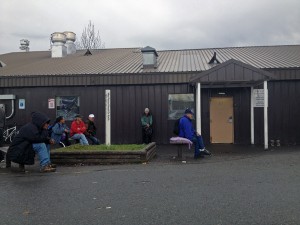Homeless advocates are working toward opening a special shelter for some of the city’s most vulnerable homeless people. They’re hoping to open the city’s first overnight shelter for the mentally ill.

With picture windows, a view of the Chugach mountains and a big screen TV, the front room of the Anchorage Community Health Services Center building downtown, is a living room for the homeless.
About two-dozen or so people spend their days in the large airy room overlooking Brother Francis Shelter and Beans Cafe, where they can shower, read and relax.
“We’ve got a number of chairs and television and laundry and computers for people to get on and look for educational opportunities, for work and then also for housing,” John Sperbeck, a manager with Anchorage Community Mental Health Center, said.
Right now the organizations just hosts the homeless during the day.
Twenty-five people are allowed inside at a time and 60 or so people visit the room each day. Sperbeck hopes the space will soon double as a small nighttime overflow shelter especially for those with severe mental illness. He says for the mentally ill, the main downtown shelter, Brother Francis, can be overwhelming.
“Those folks aren’t going to tolerate a large shelter setting as much so as they would be able to a smaller setting like what we’re proposing here,” Sperbeck said.

Mental illness can be exacerbated by the large shelter setting, says Sperbeck. The organization he works for proposes housing 12 to 20 people overnight for eight of the coldest months each year.
It’s something that Susan Bomalaski, the Director of Catholic Social Services, which runs Brother Francis Shelter says is sorely needed.
“To provide a shelter for those individuals that have cognitive impairments, mental health difficulties to provide them safe shelter with staff that are trained to manage their behaviors and deal with people that have those challenges,” she said.
Bomalaski says historically, people with severe mental illness are housed with the main population, which has caused increasing problems as the homeless population has grown over the past few years.
“At Brother Francis Shelter we can have 240 people there. That’s our capacity with two staff. So any one person that’s there. Let’s say they may have some kind of paranoia. They may have delusions or hallucinations. They may think somebody is picking on them when they’re not. Any one of those disruptions take the attention of the staff away from working with those other 239 people,” Bomalaski said.

Anchorage Community Mental Health has caseworkers trained to work with those suffering from mental illness and behavioral health problems. People with mental health issues make up an estimated one third of the shelter population That’s too many to house at the new shelter, but Bomalaski says removing the most vulnerable is a step in the right direction.
Brittany Matero works on homeless issues for the Municipality and is also on the Board of the Anchorage Coalition to end Homelessness. She says it’s a unique opportunity.
“Anchorage Community Mental Health Services might have this chance to actually be able to do some case management,” Matero said. “Help to look at treatment options, long term housing. To be able to have engagement on a level that we really haven’t had engagement.”
The Coalition to End homelessness is working with Anchorage Community Mental Health Center to find funding for the new shelter. Stakeholders says the it will cost an estimated 300-thousand dollars a year, but could save the city money in the long-run. They hope to have the shelter up and running by the new year.
Daysha Eaton is a contributor with the Alaska Public Radio Network.
Daysha Eaton holds a B.A. from Evergreen State College, and a M.A. from the University of Southern California. Daysha got her start in radio at Seattle public radio stations, KPLU and KUOW. Before coming to KBBI, she was the News Director at KYUK in Bethel. She has also worked as the Southcentral Reporter for KSKA in Anchorage.
Daysha's work has appeared on NPR's "Morning Edition" and "All Things Considered", PRI's "The World" and "National Native News". She's happy to take assignments, and to get news tips, which are best sent via email.
Daysha became a journalist because she believes in the power of storytelling. Stories connect us and they help us make sense of our world. They shed light on injustice and they comfort us in troubled times. She got into public broadcasting because it seems to fulfill the intention of the 4th Estate and to most effectively apply the freedom of the press granted to us through the Constitution. She feels that public radio has a special way of moving people emotionally through sound, taking them to remote places, introducing them to people they would not otherwise meet and compelling them to think about issues they might ordinarily overlook.




